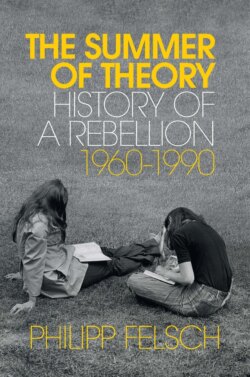Читать книгу The Summer of Theory - Philipp Felsch - Страница 21
School of Hard Books
ОглавлениеIn 1965, shortly after the Alternative special issue appeared, the newly appointed Professor of Hermeneutics and Jewish Studies Jacob Taubes invited Gente into his office. Up to then, he had taken no notice of the quiet student in his seminars, but he found Gente’s knowledge of the French thinkers remarkable. As a token of his appreciation, Taubes offered Gente one of his envied student assistant positions. Gente’s first assignment was to unpack Taubes’s library, which, he recalled, had ‘arrived from New York in heavy shipping crates’.28 At that time, it was taken for granted that a well-to-do scholar and professor would control his means of production by personal ownership.29 To the hungry eyes of his student assistant, the encounter with Taubes’s books must have been a formative experience. Taubes’s library encompassed more than the canon of German philosophy and modern classics that had come to be de rigueur for the followers of Critical Theory. It documented the reading career of a cosmopolitan intellectual who had a penchant for giving consideration to obscure and scandalous thinkers. Taubes exuded an atmosphere of scholarly intensity in which the fate of humanity seemed to depend on the interpretation of crucial texts.30 Rumour had it that he was able ‘to grasp the content of a book infallibly by merely laying his hands on it’.31 Among the mysteries of this colourful personality is the fact that, in spite of – or perhaps because of – this gift as a reader, he was not prominent as an author. Adorno, whose relationship with Taubes was strained, thought he was ‘simultaneously highly gifted and deeply disturbed in his productivity’.32 To the students who felt attracted to his intellectual excitement, Taubes conveyed the existential importance of theory. The Department of Hermeneutics that he established at Freie Universität ‘was the centre of often wildly interdisciplinary studies, highly controversial, and a sanctuary for many who did not want to tread any predefined path’, recalled Henning Ritter, who was a tutor under Taubes in the sixties.33 One of the nonconformists broadening their intellectual horizons in this circle was the student assistant Peter Gente. Those who came under Taubes’s influence were exposed to sufficient apocrypha to immunize them against the dogmatism of the student movement. They were also estranged from Adorno, whom Taubes in turn considered a ‘protesting left-wing Heideggerian’ with an affected style.34 ‘Who here can write as beautifully as Adorno?’ he is said to have shouted repeatedly during a lecture, ‘laughing eerily.’35
Taubes had neither Adorno’s talent as a writer nor his reluctance to intervene in politics. At Freie Universität, which he saw as something like the Berkeley of Germany, Taubes took the side of the rebelling students. And yet he responded with scepticism to their utopian expectations. The activity of the SDS interested him more for its subversive energy than for its socialist background. When the Kommune I members Fritz Teufel and Rainer Langhans were made to stand trial for distributing a handbill inciting people to burn down department stores, Taubes wrote, as an amicus curiae, an evaluation of the ‘surrealist provocation’, situating it in the tradition of literary avant-gardes. His submission helped the communards escape a jail sentence.36 In July of 1967, Taubes moderated a public discussion at FU with his friend Herbert Marcuse, who drew boisterous enthusiasm from the students. Taubes invited the Parisian Hegel interpreter Alexandre Kojève to Berlin the same year, who perplexed his revolutionary listeners by recommending that the best thing to do in the present situation was to learn Ancient Greek. Kojève’s snobbism was incomprehensible to the ’68 generation. Only initiates among Taubes’s students could decipher, perhaps, that Kojève was serving up a taste of his theory of ‘post-histoire’.37 Taubes himself also knew how to subvert leftists’ expectations, which sometimes made his political engagement difficult to gauge. The right-wing intellectual Armin Mohler, Taubes’s friend from undergraduate days, was of the opinion that he wanted to inoculate the protest movement ‘with surrealism’.38
